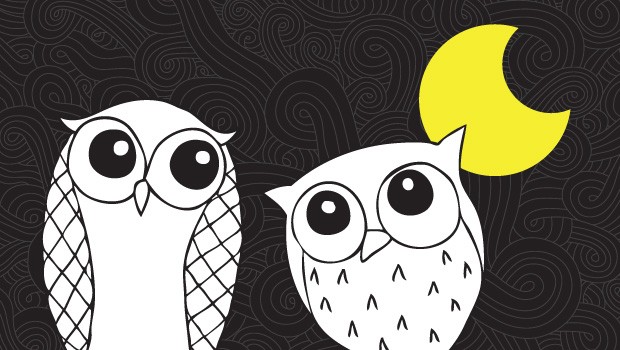5 reasons night owls outperform early birds
Full disclosure: this is partially a self-serving post. I’m a competitive night owl and thus gravitate toward studies that support the underrated and unsurpassed brilliance of night owls.
We recently discussed the trend of extreme transparency in the workplace, focusing on Buffer, where employees know the sleeping habits of their colleagues. Night owls still tend to be regarded with a little bit of suspicion. Sure, even the most old-fashioned bosses tend to be impressed by the occasional burning of midnight oil, but what happens when midnight oil is the norm and 8am coffee is the exception?
Often times, those night owls are outperforming the early birds.
Why?
Superior focus
Here’s where night owls and early birds agree: it’s a special sort of feeling to be locked in a productive groove while the rest of the world sleeps. In the morning, though, the disruptions and distractions are waking up all around you. At night, they’re all fading away. We’re less likely to fall into the trap of multitasking (which hardly anyone does as well as they think). Night owls can generally sustain focus for a longer amount of time than early birds, who tend to hit walls in the late afternoon. Plus, night owls don’t have to waste any time telling their coworkers about how long they’ve been in the office.
The night time is the right time for creativity
Collectively, we’re slowly learning that not everyone thrives equally under identical work conditions. You may notice some correlation between schedule preference and type of job. “Evening types tend to be the more extrovert creative types, the poets, artists and inventors, while the morning types are the deducers, as often seen with civil servants and accountants,” Professor Jim Horne told the Independent.
Creativity and nocturnal habits go so well together that there’s even a Wikipedia section devoted to it. Proust and Joyce are on our team. So is Churchill. So is every musician you love. So are Hitler and Stalin, but shush. Moving on…
It’s evolution, baby
Night owls may be faster to adapt to challenges and changes in your workplace. The proof? They’ve already evolved faster than their peers, shaking off a schedule that once was much more closely tethered to success and survival.
Your circadian rhythms are missing a beat
It’s a lovely idea that an early schedule keeps you connected to your primal self and the tides of the ocean or whatever. Here’s the thing, though: your analytical skills aren’t especially impacted by time of day, but when you need a flash of inspiration to solve a routine-thwarting challenge, you may benefit from ditching your “natural” clock. Marieke B. Wieth and Rose T. Zacks go into (way more) detail in “Time of day effects on problem solving: When the non-optimal is optimal” in the Thinking & Reasoning journal.
Night owls no longer have to fly off the radar
The real lesson for businesses is to let people work to their individual strengths as much as possible. When it comes to schedules, these preferences may even be embedded in our genes. Especially in this new era of workplace flexibility, the focus in many situations should be on the quality of work, not the when or where related to work. If your company can’t quite let everyone off the leash completely, collaboration tools like iMeet Central offer a range of features to assist in oversight and accountability.






